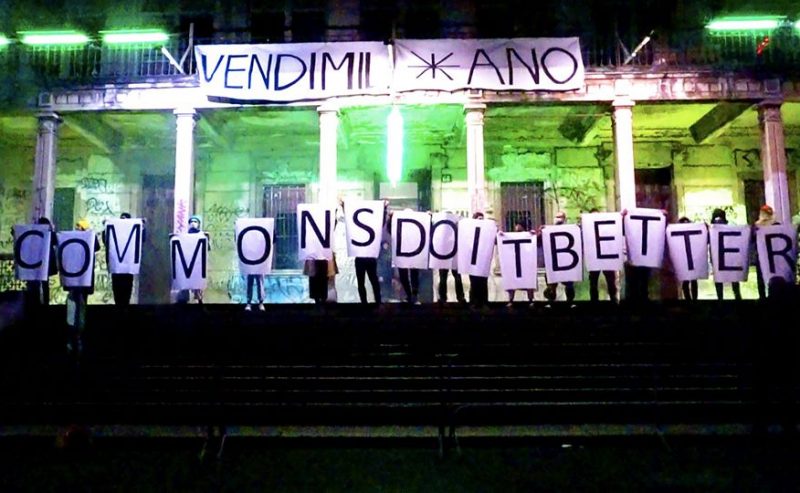*Inverting cities*
Condividiamo dalla pagina di MACAO questo contributo contro la gentrificazione:
Se reinventare la città vuol dire attrarre investimenti per renderla sempre più inaccessibile, la città noi vogliamo invertirla.
Non è certo di Moncler che vogliamo parlare; come tante altre, l’industria della moda abusa animali, corpi di donne*, lavorator* e risorse ambientali.
A questo abuso, l’amministrazione della città concede spazi e vetrine: basta pagare.
E di fronte a questo abuso, noi invertiamo: facciamo che chi abusa delle risorse del pianeta e concentra ricchezze nelle mani di sempre meno maschi-bianchi è fuori moda.
Facciamo che sono fuori moda il cemento e i suoi adepti, le politiche della crisi e della povertà strutturale; fuori moda la famiglia tradizionale, le città disegnate dagli imprenditori, il patriarcato immanente delle televisioni, i giornali misogini e la violenza dei confini e dei visti; il lavoro coatto, sfruttato, mal pagato, senza alcun senso. Fuori moda sono i ricchi che, anche se pochi, hanno proprio rotto il cazzo col desiderio di fuggire su Marte, mentre ai piani Terra si accumula merda, malattia e morte.
Diciamo che è fuori moda tutto quello che è in direzione contraria a ciò per cui bisognerebbe realmente spendere del tempo: riparare la terra, noi, le nostre relazioni e vite. Diciamocelo sì, perché quando le cose sono mortifere non funzionano, sono rotte, sono out.
Fuori moda è ciò che non lavora per garantire la redistribuzione di risorse e felicità.
Per questo, mentre Moncler trasforma un capannone abbandonato in show business e il Comune di Milano mette a bando, con Reinventing Cities, la più grande area cittadina dismessa d’Europa – svendendo pezzi di città e spazi per la collettività sotto un vestito lavato green-trendy, a noi pare non vedere proprio nulla di nuovo – tutto, infatti, sembra molto dritto: nessuna trasformazione in corso.
Se reinventare la città non vuol dire “invertire” i trend finanziari che ci hanno portato fino a qui, rimettere al centro corpi, diritti e desideri di esseri e ambienti umani e non umani e cambiare rotta ai privilegi, allora è tutta fuffah: *#sietefuorimoda*.
Ci hanno insegnato a pensare che il capitalismo sia la forma più efficiente di gestione delle risorse di tutt*; eppure, dopo un paio di secoli sappiamo sulla nostra pelle che il prodotto di questa presunta efficienza è che in pochissimi ottengono moltissimo.
Questo modo di pensare è solo una strategia per difendere le posizioni del potere e dei potenti, ed eliminare qualsiasi diversa narrazione sulla gestione delle risorse.
Ma basta capovolgere lo sguardo per rendersi conto che la vera trasformazione è includere, dove la speculazione esclude; cooperare dove il mercato compete; convivere, dove la gentrification marginalizza; fare commons, dove le amministrazioni pubbliche privatizzano.
La vera trasformazione è fare in modo che accada: *#commonsdoitbetter*.
If reinventing the city means attracting investments to make it increasingly inaccessible, we want to invert the city.
Certainly, we do not want to talk just about Moncler; like many others, the fashion industry exploits animals, womxn’s bodies, workers, human and environmental resources.
To this exploitation, the city administration grants spaces and showcases: you just need to pay. In front of this abuse, we invert: it’s out of fashion whom exploit the planet’s resources and concentrate wealth in the hands of always fewer white men.
It’s out of fashion cement and its followers, out of fashion the policies of crisis and structural poverty; the traditional family, the cities designed by entrepreneurs, the immanent patriarchy of televisions, the misogynistic newspapers and the violence of borders and visas; out of fashion the forced exploited, poorly paid labour, without any sense.
Out of fashion are the riches, even if few, they have really broken our balls with their desire to escape to Mars, while back on Earth shit, sickness and death are accumulated.
Let’s say that it is out of fashion everything that goes in the opposite direction to what we really should spend our time on doing: to repair the earth, us, our relationships and lives. Let’s face it, yes, because when things are deadly, they don’t work, they are broken, they are out. Out of fashion is what does not work to ensure the redistribution of resources and happiness. For this reason, while Moncler transforms an abandoned shed into show business and the Municipality of Milan puts on auction, with Reinventing Cities, the largest abandoned city area in Europe – selling off pieces of the city and spaces for the communities under a green washed suit – we don’t seem to see anything new at all.
In fact, everything seems very clear: no transformation in progress.
If reinventing the city does not mean “inverting” the financial trends that have brought us here, putting bodies, rights, environment and desires of human and non-human beings at the centre and changing course to privileges, then it’s all crap: *#youareoutofashion*.
They taught us to think that capitalism is the most efficient form of resource management of all; yet, after a couple of centuries we know on our flesh that the product of this presumed efficiency is that very few get the most. This way of thinking is only a strategy to defend the positions of power and the powerful people, and to eliminate any different narratives about resource management. You just need to turn your gaze upside down to realize that the real transformation is to include, where speculation excludes; cooperate where the market competes; live together, where gentrification marginalizes; make commons, where public administration privatizes. The real transformation is making it happen: *#commonsdoitbetter*
Tag:
gentrificazione Inverting cities macao metropoli Milano


